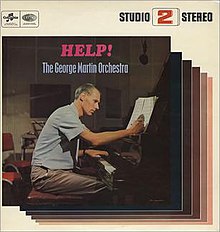
Help! is the fifth studio album by the English rock band the Beatles and the soundtrack to their film of the same name. It was released on 6 August 1965. Seven of the fourteen songs, including the singles "Help!" and "Ticket to Ride", appeared in the film and take up the first side of the vinyl album. The second side includes "Yesterday", the most-covered song ever written. The album was met with favourable critical reviews and topped the Australian, German, UK and US charts.

"She Loves You" is a song written by John Lennon and Paul McCartney and recorded by English rock band the Beatles for release as a single in 1963. The single set and surpassed several sales records in the United Kingdom charts, and set a record in the United States as one of the five Beatles songs that held the top five positions in the charts simultaneously, on 4 April 1964. It remains the band's best-selling single in the United Kingdom and was the top-selling single of the 1960s there by any artist.

Introducing... The Beatles is the first studio album released by the English rock band the Beatles in the United States. Originally scheduled for a July 1963 release, the LP came out on 10 January 1964, on Vee-Jay Records, ten days before Capitol's Meet the Beatles!. The latter album, however, entered the U.S. album chart one week before the former. Consequently, when Meet The Beatles! peaked at No. 1 for eleven consecutive weeks, Introducing...The Beatles stalled at No. 2 where it remained for nine consecutive weeks. It was the subject of much legal wrangling, but ultimately, Vee-Jay was permitted to sell the album until late 1964, by which time it had sold more than 1.3 million copies. On 24 July 2014 the album was certified gold and platinum by the RIAA.

"Ticket to Ride" is a song by the English rock band the Beatles, written primarily by John Lennon and credited to Lennon–McCartney. Issued as a single in April 1965, it became the Beatles' seventh consecutive number 1 hit in the United Kingdom and their third consecutive number 1 hit in the United States, and similarly topped national charts in Canada, Australia and Ireland. The song was included on their 1965 album Help! Recorded at EMI Studios in London in February that year, the track marked a progression in the Beatles' work through the incorporation of drone and harder-sounding instrumentation relative to their previous releases. Among music critics, Ian MacDonald describes the song as "psychologically deeper than anything the Beatles had recorded before" and "extraordinary for its time".
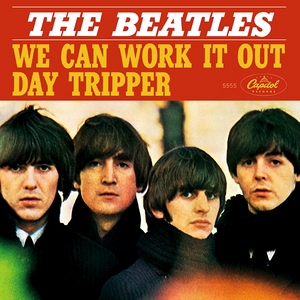
"We Can Work It Out" is a song by the English rock band the Beatles, written by Paul McCartney and John Lennon. It was first issued as a double A-side single with "Day Tripper" in December 1965. The song was recorded during the sessions for the band's Rubber Soul album. The single reached number one in Britain, the United States, Australia, Canada and Ireland. In the UK, it was the seventh highest selling single of the 1960s.

The Beatles' Story is the sixth album by the English rock band the Beatles in the United States, issued on 23 November 1964 by Capitol Records. It is a documentary double album featuring interviews, press conferences, and snippets of original or orchestral versions of Beatles songs, with voice-over narration. The album's original liner notes described it as a "narrative and musical biography" of Beatlemania. It was produced by Los Angeles–based songwriter and producer Gary Usher and disc jockey and lyricist Roger Christian, and narrated by John Babcock, Al Wiman and Christian.
The discography of English singer-songwriter and former member of the Beatles, George Harrison consists of 12 studio albums, two live albums, four compilation albums, 35 singles, two video albums and four box sets. Harrison's first solo releases – the Wonderwall Music film soundtrack (1968) and Electronic Sound (1969) – were almost entirely instrumental works, issued during the last two years of the Beatles' career. Following the band's break-up in April 1970, Harrison continued to produce recordings by his fellow Apple Records acts, notably former bandmate Ringo Starr. He recorded and collaborated with a wide range of artists, including Shankar, Bob Dylan, Eric Clapton and Gary Wright.

"The Night Before" is a song by the English rock band the Beatles from their 1965 film Help! and soundtrack album of the same name. It was written primarily by Paul McCartney and credited to the Lennon–McCartney partnership. Described as a pop rock or rock and roll song, its lyrics reflect on the singer's last night with his lover before being abandoned.

"Tell Me What You See" is a song by the English rock band the Beatles that first appeared in 1965 on their album Help! in the United Kingdom and on Beatles VI in the United States. The song is credited to Lennon–McCartney but mainly written by Paul McCartney. Regarding the song's authorship, McCartney said, "I seem to remember it as mine. I would claim it as a 60–40 but it might have been totally me." John Lennon said, in his interviews with Playboy (1980) and Hit Parader (1972), that "Tell Me What You See" was written completely by McCartney.
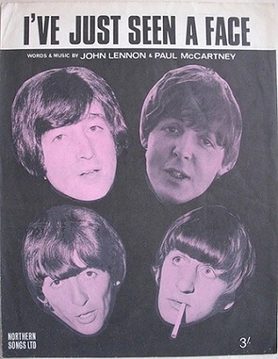
"I've Just Seen a Face" is a song by the English rock band the Beatles. It was released in August 1965 on their album Help!, except in North America, where it appeared as the opening track on the December 1965 release Rubber Soul. Written and sung by Paul McCartney, the song is credited to the Lennon–McCartney partnership. The song is a cheerful love ballad, its lyrics discussing a love at first sight while conveying an adrenaline rush the singer experiences that makes him both enthusiastic and inarticulate.
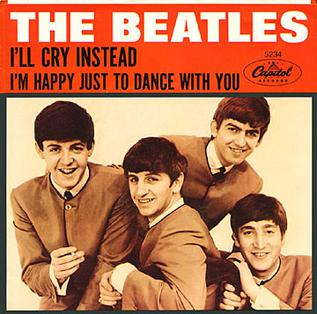
"I'll Cry Instead" is a song written by John Lennon, and recorded by the English rock band the Beatles for their third studio album, A Hard Day's Night (1964), a part-studio and part-soundtrack album to their film of the same name (1964). In the United States, the song originally appeared in the US version of A Hard Day's Night before it was released as a single backed with "I'm Happy Just to Dance with You" along with the US album Something New.
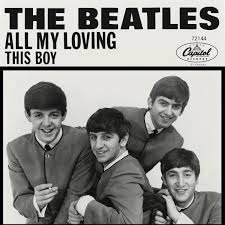
"All My Loving" is a song by the English rock band the Beatles, from their second UK album With the Beatles (1963). It was written by Paul McCartney, and produced by George Martin. Though not officially released as a single in the United Kingdom or the United States, the song drew considerable radio airplay, prompting EMI to issue it as the title track of an EP. The song was released as a single in Canada, where it became a number one hit. The Canadian single was imported into the US in enough quantities to peak at number 45 on the US Billboard Hot 100 in April 1964.

Encouraging Words is the fifth studio album by American soul musician Billy Preston, released in September 1970 on Apple Records. It was the last of Preston's two albums for the Beatles' Apple label, after which he moved to A&M Records. The album was co-produced by George Harrison and Preston. Harrison's songs "All Things Must Pass" and "My Sweet Lord" were issued here for the first time, two months before his own recordings appeared on his triple album All Things Must Pass.

The Family Way is a soundtrack album composed by Paul McCartney, produced and arranged by George Martin, and credited to "the George Martin Orchestra". Released on Decca Records in January 1967 under the full title The Family Way , it is the soundtrack to the 1966 film The Family Way, directed by Roy Boulting and starring Hayley Mills. It consists of Martin's arrangements of music composed by Paul McCartney of the Beatles especially for the project. The record was preceded by a non-album single, again credited to the George Martin Orchestra, issued on 23 December 1966 by United Artists Records and comprising "Love in the Open Air" backed with "Theme from 'The Family Way'".
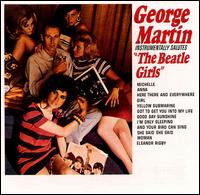
George Martin Instrumentally Salutes "The Beatle Girls" is a 1966 album by George Martin & His Orchestra. It is the third in a series of albums by Martin, the Beatles' producer at the time, that consist of instrumental arrangements of Beatles songs. It was released by United Artists Records on 28 November 1966 in the United States, with the United Kingdom release following on 3 March 1967.
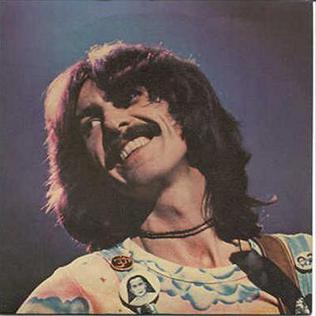
"You" is a song by English musician George Harrison, released as the opening track of his 1975 album Extra Texture . It was also the album's lead single, becoming a top 20 hit in America and reaching number 9 in Canada. A 45-second instrumental portion of the song, titled "A Bit More of You", appears on Extra Texture also, opening side two of the original LP format. Harrison wrote "You" in 1970 as a song for Ronnie Spector, formerly of the Ronettes, and wife of Harrison's All Things Must Pass co-producer Phil Spector. The composition reflects Harrison's admiration for 1960s American soul/R&B, particularly Motown.
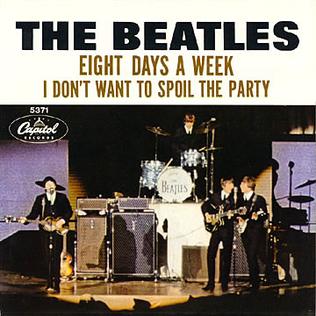
"Eight Days a Week" is a song by the English rock band the Beatles. It was written by Paul McCartney and John Lennon based on McCartney's original idea. The song was released in the United Kingdom in December 1964 on the album Beatles for Sale. In the United States, it was first issued as a single in February 1965 before appearing on the North American release Beatles VI. The song was the band's seventh number 1 single on the Billboard Hot 100, a run of US chart success achieved in just over a year. The single was also number 1 in Canada, Belgium and the Netherlands.

"All That I've Got (I'm Gonna Give It to You)" is a song by American soul musician Billy Preston that was released in January 1970 as his third single on Apple Records. It was written by Preston and his fellow Apple artist Doris Troy and produced by George Harrison. In the United States, the single missed the Billboard Hot 100 chart, peaking at number 108. According to Harrison, the song was Preston's musical response to criticism that he had abandoned his black soul roots by embracing rock music.

Footprint is the second solo album by American musician Gary Wright, released in 1971 on A&M Records. It contains "Stand for Our Rights", an anthem-like song calling for social unity that was issued as a single in advance of the album. Wright recorded the majority of Footprint in London with a large cast of musicians – including George Harrison, Hugh McCracken, Alan White, Klaus Voormann, Jim Gordon, Jim Keltner and Bobby Keys – many of whom, like Wright, had played on Harrison's All Things Must Pass triple album in 1970. Harrison's contributions included an uncredited role as producer, and serve as an example of his support for Wright during the early stages of Harrison's solo career. The ballad "Love to Survive" is one of three tracks that feature an orchestral arrangement by John Barham.
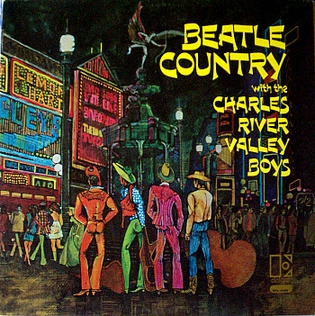
Beatle Country is the fourth and final studio album by the American bluegrass band Charles River Valley Boys, released in November 1966 by Elektra Records. Where the Charles River Valley Boys' previous albums consisted of traditional and new bluegrass and some early country songs, Beatle Country contains only covers of the Beatles. The band and several session musicians completed the album at Columbia's studio in Nashville, Tennessee, across four days in September 1966. Paul A. Rothchild and Peter K. Siegel produced the album, with Glenn Snoddy as audio engineer.
